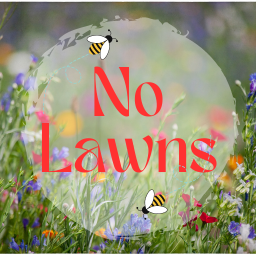Hello, I am definitely no gardener, and I am a total noob to all of this. So I want to begin small. I live in Lexington, KY within the sub-region Inner Bluegrass, inside the Greater Bluegrass Area, in the Interior Plateau, of the Southeastern USA Plains, within the broader Eastern Temperate Forest eco region, in North America (USDA Plant Hardiness Zone 6b).
I would like to increase my lawn’s benefit for pollinators. I have already planted a native oak, several native blueberries, sweet joe pye, and some goldenrod.
I have a patch that I estimate to be about 500 sq feet that I’d like to do something with. It gets both sun and shade at different times of day. I made the mistake of not cardboard sheet mulching or solarizing before sowing wildflower seeds in that strip, and now that area is overrun with narrowleaf plantain, geranium dissectum, veronica arvensis, and all manner of things that Picture This has trouble identifying consistently.
My question for your collective wisdom is this:
Are any of the following plants a bad idea for me to introduce into this space? Are any so aggressive that I would regret it? (Each grouping below is a different “bundle” they offer.)
Lanceleaf Coreopsis Orange Butterfly Milkweed Smooth Blue Aster Grayleaf Goldenrod
Purple Coneflower Rough Blazing Star Purple Lovegrass Downy Wood Mint
Golden Alexander Jacob’s Ladder Blue Wood Aster
Narrow Leaved Sunflower
Spotted Beebalm
Frostweed
Blue Mistflower
Cardinal Flower Great Blue Lobelia Foxglove Beard Tongue Black Eyed Susan
The above are just options from various bundles sold at gardenforwildlife dot com.
I was also looking at a seed mix from a different seller that contained the following:
Schizachyrium scoparium - Little Bluestem Agrostis perennans - Autumn Bentgrass Chamaecrista fasciculata - Partridge Pea Echinacea purpurea - Purple Coneflower Gaillardia pulchella - Indian Blanket Astragalus canadensis - Canadian Milk Vetch Coreopsis lanceolata - Lanceleaf Coreopsis Rudbeckia hirta - Black-eyed Susan Coreopsis tinctoria - Plains Coreopsis Liatris spicata - Dense Blazingstar Dalea purpurea - Purple Prairie Clover Asclepias incarnata - Swamp Milkweed Asclepias speciosa - Showy Milkweed Eryngium yuccifolium -Rattlesnake Master Zizia aurea- Golden Alexanders Asclepias tuberosa - Butterfly Milkweed Monarda fistulosa - Wild Bergamot Tradescantia ohiensis - Ohio Spiderwort Gaillardia aristata - Blanket Flower Achillea millefolium L. var. occident - Western Yarrow Monarda citrodora - Lemon Mint Aster laevis - Smooth Aster Penstemon digitalis - Foxglove Beardtongue Penstemon tubaeflorus - White Wand Beardtongue Pycnanthemum virginianum - Virginia Mountain Mint Lobelia siphilitica - Great Lobelia Solidago nemoralis - Dwarf Goldenrod
Is there any reason to steer clear of that seed pack?
And finally, in your opinion, should I skip the above plant bundles or seed packs and choose different landmarks to plant, and if so, what?


I’m not able to double-check for you (I probably can later), but I would first verify everything is native. You can use sites like USDA plants to find range maps for individual species.
I like to buy from opnseed and their woodland edge mix sounds like a good fit assuming it’s all native.
I would also evaluate the moisture conditions of your site. Some plants like it drier, some wetter.
Thanks. I was most concerned about seeing a plant described as a “mint” on the NWF list.
There are native mints as well as invasive. It’s always a good idea to check the range maps
Just adding another possible place to check. You can look for a local chapter of wild ones.